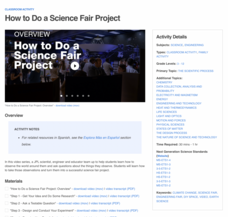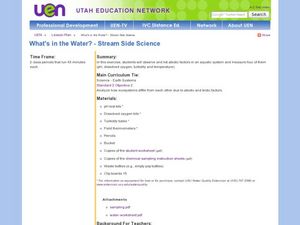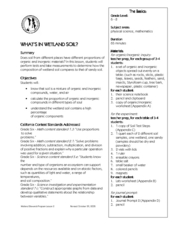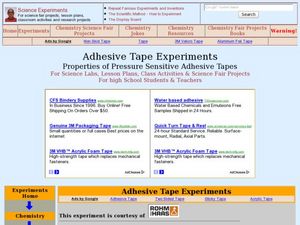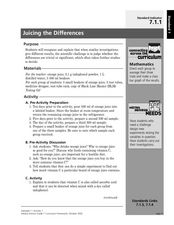NASA
How to Do a Science Fair Project
Build problem-solving skills with science! Step-by-step videos walk investigators through each stage of completing a science fair project. Scientists learn to formulate a testable question, design an experiment, collect data, draw...
College Board
AP® Computer Science A: Elevens Lab Student Guide
Looking for a project to use in an AP® Computer Science class? Engage learners with a simple solitaire game called Elevens. Through these activities, learners break down the task and write the code for a game. Sign in to your College...
Captain Planet Foundation
Square Foot Fall Garden
First graders learn the basic needs of plants and identify geometric shapes while planting a fall garden. Combining math and science in one lesson, the resource guides kids through starting their class garden as they...
Kenan Fellows
Terrarium in a Bottle: Modeling the Atmosphere, Greenhouse Effect, and Water Cycle
You've heard of farm to table ... but what about farm in classroom? Junior agriculturalists embark upon a two-week journey into the science of growing things. Based upon the classic terrarium in a two-liter experiment, the lesson goes...
National Wildlife Federation
Green Green Revolution
School budgets don't have a lot of extra money, so when students propose saving the district money, everyone jumps on board. The first lesson in the series of 21 introduces the concept of an energy audit. Scholars form an eco-action team...
Carnegie Mellon University
Lab Report
A set of instructions and a 100-point grading rubric have been designed for writing lab reports. Appropriate for middle schoolers, this lays out what to include for each of the six steps in the scientific method: title, hypothesis,...
Curated OER
What's in the Water? - Stream Side Science
Here is a complete activity in which young biologists or ecologists test the pH, dissolved oxygen, turbidity and temperature of stream water. The class visits an actual stream and makes observations of the site. They use scientific...
Curated OER
Aquatic Science and IPC
Students explain the importance of water in our daily lives. In this aquatic science lesson, students identify different ways to purify water and make it potable. They design and construct a water filter based on researched information.
Curated OER
The Affect of Water Temperature on Living Organisms
Students examine the environmental impact of global warming. In this environmental science lesson, students design and conduct an experiment about the effect of temperature on paramecia. They write a lab report about their experiment.
Curated OER
What's in Wetland Soil?
Students examine the organic and inorganic components of soil. In this environmental science lesson, students identify the factors that influence soil formation. They collect soil samples, conduct tests, and analyze the results.
Curated OER
Classroom Science Fair Project
Students explore the skills and information needed to complete a science fair project. They follow guidelines to create an document their science fair project.
Google
Code for Equality
It's my belief that all learners should have equal access to computer science projects! Young computer scientists learn about variables, encapsulation, sequences, and objects in block-based coding. They create a collage by first...
Curated OER
Multiplication: Bugs Can Multiply, So Can I!
Develop multiplication skills with your class. Youngsters will visualize multiplication as repeated addition. Then they will create a multiplication bug book and discover arrays as a strategy for multiplication problem solving....
Google
Design Your Own Emoji Holiday
You'll want to rank the project with a smiley face. Future computer scientists complete a fun activity where they design a holiday-themed emoji. They use block-based coding and learn about the concepts of variables, encapsulation,...
Google
Snapchat Geofilter
Sometimes pictures could use a little help. Scholars add filters, frames, stamps, and text to a background photograph. They learn to use variables, encapsulation, sequences, and objects as they use the Blockly programming language.
Google
Teacher Appreciation
Show your teacher you care. Young scholars use the Blockly programming language to create a card for their teachers. Using variables, encapsulation, objects, and sequences helps advance their computer science knowledge at the same time.
Curated OER
Pick a Pet
Students design informational materials to educate people on the importance of matching a new pet to the family's lifestyle and living arrangements. Students use critical thinking skills to make a decision on the appropriate choice for a...
Curated OER
Designing a Germination Experiment
Students explore botany by participating in a seed experiment. In this plant nutrition lesson, students define several science experiment vocabulary terms like observation, treatment, and replicate. Students utilize soaked seeds in a...
Curated OER
Systems: Up, Up and Away
Students design and test rockets to determine what variables are necessary in order to optimize the system to make it function best.
Curated OER
Adding Creativity to Science Inquiry
Young scholars investigate friction by manipulating some of the variables affecting it. In this inquiry lesson, students design their own experiment. They create a video about it and share it to class.
Curated OER
Race the Track! The Time Challenge (lesson 2)
Students design a track that keeps a ball in motion for 5 seconds or longer. In this designing lesson plan, students explore force, gravity, and cause and effect when it comes to science and building before building their own track.
Curated OER
"Stick to It!" Properties of Pressure Sensitive Adhesive Tapes
Students investigate the strength of different adhesives. In this physical science lesson plan, students compare the force needed to peel adhesive tapes from a surface. They analyze collected data and make a generalization.
Curated OER
Juicing the Differences
Seventh graders investigate the vitamin C content of orange juice. In this chemistry lesson plan, 7th graders analyze the variables that cause result variation in their experiment. They design a new experiment to test variables in question.
Curated OER
Cooking Up the Scientific Method
First graders identify the different steps of the scientific method. In this life science lesson, 1st graders apply this method when conducting a series of hands-on activities. They collect data and write observations in their journals.
Other popular searches
- Science Variables
- Science Experiment Variables
- Science Control Variables
- Science Variables Game
- Variables Science Quiz
- Catapults Science Variables
- Science Project With Variables
- Practicing Science Variables
- Identifying Science Variables
- Physical Science Variables
- Identifing Science Variables
- Science Variables Worksheets
